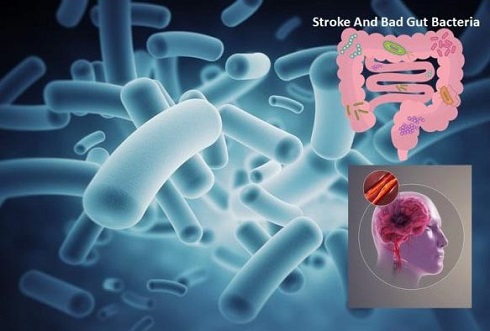Nikhil Prasad Fact checked by:Thailand Medical News Team Jul 23, 2024 9 months, 2 days, 6 hours, 34 minutes ago
Medical News:
Understanding Stroke - More Than Just a Brain Problem
Stroke remains one of the most serious health threats worldwide, being a leading cause of death and long-term disability. While we often think of stroke as a purely brain-related issue, new research highlights that the roots of stroke can extend far beyond the brain, involving complex interactions between metabolic health, gut microbiota, and systemic inflammation. This
Medical News report dives into these intriguing findings and their implications for stroke prevention and treatment.
 Gut health and inflammation are also risk factors for stroke
The Key Players: Metabolism, Gut Microbiome, and Inflammation
Gut health and inflammation are also risk factors for stroke
The Key Players: Metabolism, Gut Microbiome, and Inflammation
Researchers from Nicolaus Copernicus University in Toruń, Poland, have explored the intricate connections between metabolic dysregulation, gut microbiota, and inflammation in stroke development. Led by Dr Jarosław Nuszkiewicz and his team, the study sheds light on how these factors intertwine to influence the risk and outcomes of acute ischemic stroke (AIS).
Metabolic Dysregulation: The Underlying Issue
Metabolic dysregulation refers to the abnormal functioning of the body's metabolic processes, often seen in conditions like obesity and diabetes. This dysregulation is linked to an increased risk of cardiovascular diseases, including stroke. One significant aspect is the role of adipokines - hormones produced by fat tissue. In obesity, adipokines can become dysregulated, promoting inflammation and contributing to the development of stroke.
The Gut-Brain Connection: More Than Just a Feeling
The human gut is home to trillions of microorganisms, collectively known as the gut microbiota. These microbes play a crucial role in digestion, immune function, and overall health. Disruptions in gut microbiota can lead to systemic inflammation, a known risk factor for stroke. This article highlights the importance of maintaining a healthy gut microbiota to potentially reduce stroke risk.
Inflammation: The Silent Contributor
Inflammation is a natural response of the body to injury or infection. However, chronic inflammation can have detrimental effects on health, including the risk of stroke. The study emphasizes the role of systemic inflammation in stroke development and how it interacts with metabolic health and gut microbiota. Understanding these interactions can help in devising new strategies for stroke prevention.
Key Study Findings: A Deeper Dive
The researchers discovered several critical points about the relationship between metabolic dysregulation, gut microbiota, and inflammation in stroke:
-Adipokines and Inflammation: Dysregulated adipokines in obesity can exacerbate inflammation, increasing the risk and severity of stroke. These adipokines influence systemic inflammation, which can directly impact cerebrovascular health.
-Gut Microbiota Disruptions: Changes in the gut microbiota can lead to systemic inflammation. The translocation of gut-derived lipopolysaccharides (LPS) into the bloodstream triggers widespread inflammatory responses, affecting not only the gut but also the brain's vascular health.
-Systemic to Neuroinflammation: The transition from systemic inflammation to neuroinflammation involves the activation of immune cells in the brain, such as microglia and astrocytes. This activation can lead to further neuronal damage and worsen stroke outcomes.
The Role of Advanced Diagnostic Tools
Advances in neuroimaging and biomarker development have improved the diagnosis of stroke. Identifying specific biomarkers linked to metabolic dysregulation and inflammation can help in early detection and personalized treatment approaches. This study highlights the need for a multifaceted approach to stroke management, integrating metabolic, microbiota, and inflammatory insights.
Therapeutic Strategies: Looking Forward
Potential therapeutic strategies targeting these pathways could significantly improve stroke prevention and treatment. By addressing metabolic dysregulation, restoring healthy gut microbiota, and managing inflammation, we can reduce the risk and improve outcomes for stroke patients. Future research should focus on further elucidating these pathways and developing targeted interventions.
Conclusion
The findings from Nicolaus Copernicus University offer a comprehensive view of the complex interplay between metabolic health, gut microbiota, and inflammation in stroke development. This research opens new avenues for prevention and treatment, emphasizing the importance of a holistic approach to managing stroke risk.
The study findings were published in the peer-reviewed Journal of Clinical Medicine.
https://www.mdpi.com/2077-0383/13/14/4258
For the latest about Strokes, keep on logging to Thailand
Medical News.
Read Also:
https://www.thailandmedical.news/news/body-water-balance-a-key-to-recovery-in-stroke-patients
https://www.thailandmedical.news/news/cerebral-microbleeds-increases-risk-of-stroke-or-dementia
https://www.thailandmedical.news/news/covid-19-and-stroke-new-insights-on-inflammation-and-recovery
